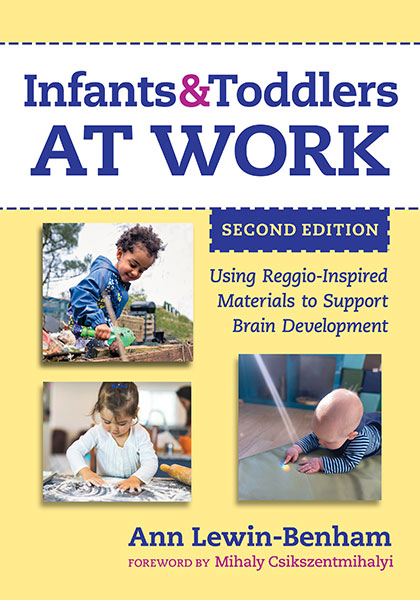Professors: Request an Exam Copy
Print copies available for US orders only. For orders outside the US, see our international distributors.
Second Edition
Publication Date: September 22, 2023
Pages: 240
Series: Early Childhood Education Series

Now in a second edition, this popular resource shows teachers and childcare providers how to work with young children based on current neuroscience research. Revised and expanded, it contains a wealth of practical and specific activities and materials to use with infants and toddlers to enhance growth and development. For each activity presented, the text examines its relation to the rapid brain growth that characterizes the 0 to 3 years, including major developments in sensory reception, movement, language, cognition, memory, vision, and motivation. Featured materials, with guidance for their use and where to find them, include paint, mark-makers, man-made found objects, natural objects, clay, paper, and light and shadow. This edition features many full color images and two new chapters on using electronic technology with infants and toddlers written by outstanding early educators. This is an essential guide for trainers and professionals who work with very young children, as well as parents and other caregivers.
Book Features:
Ann Lewin-Benham founded and for 20 years directed the Capital Children’s Museum in Washington, DC, where she also founded and directed the Model Early Learning Center. She is the author of Possible Schools: The Reggio Approach to Urban Education and Powerful Children: Understanding How to Teach and Learn Using the Reggio Approach.
“In this well-researched and aptly illustrated book, master educator Ann Lewin-Benham surveys authorities (like Piaget), exemplary programs (like Reggio Emilia), materials (like paper and clay), as well as current research on the brain and on technology—and skillfully integrates them.”
—Howard Gardner, Hobbs Research Professor of Cognition and Education, Harvard Graduate School of Education
Praise for the First Edition
“A wealth of information and specific suggestions for creating learning environments that capitalize on current knowledge make this an invaluable guide for practitioners and teacher educators.”
—Young Children
“Ann Lewin-Benham’s book represents an extraordinarily comprehensive yet usable guide to the neuroscientific state-of-the-art in infant and toddler cognitive development. Full of practical recommendations for engaging young children’s brains with the physical world around them, this volume will connect strongly with educators and caregivers alike.”
—Mariale Hardiman, interim dean, School of Education, Johns Hopkins University
“As we learn more and more from neuroscience about the development of the infant brain, two things have become clear: how competent babies are, and how much they depend on relationships to frame their early development. In her new book Ann Lewin-Benham helps us to understand how to respectfully relate to the developing brain.”
—J. Ronald Lally, co-director, Center for Child & Family Studies, WestEd
Contents
Foreword to the First Edition Mihaly Csikszentmihalyi xi
Acknowledgments xiii
Introduction 1
Impetus for the Book 1
Research 4
Teaching Techniques 5
Materials 6
Learning Exemplars: The Reggio Schools 7
Chapter Overviews 7
Four Big Ideas in This Book 10
1. Why Use Materials? 13
Infants and Toddlers in Flow 14
Attention and Materials 16
Humans: Unique Learners 16
Sensitive Periods and Brain Plasticity 19
Structuring the Use of Materials 27
Conclusion: Materials’ Meaning 31
2. Framing Experiences 32
The Brain’s Attention Systems 33
Facing Complexity 36
Challenges: Glue, Scissors, Clay, Sewing 40
Conclusion: Accumulating Skills 48
3. Infants and Materials 49
Infants’ Predispositions 49
Adults’ Intentionality 52
Food, Paper, Fabric, Sound 54
Day by Day in Provocative Infant Spaces 59
Conclusion: Natural Learners 65
4. Man-Made Materials 66
Cultural Contrasts: 10,000 Years Ago and Now 67
Reggio and Neuroscience Resonances 69
The Design and Development of Materials 73
One Huge and Many Small Events 78
Conclusion: Meaning-Full Materials 83
5. Painting With Tempera 84
Stumbling, Reflecting, Learning 85
A Theory of How We Learn 87
Teaching With Intention 90
A Culture of Relationships 91
Beginning Use of Tempera 96
Conclusion: The Joy of Painting 101
6. Clay 102
6-Month- and 2-Year-Old Reactions 102
Molding the Brain 110
Joyful Tactile Experiences 116
Conclusion: Clay, Creativity, and Competence 118
7. Mark-Making 119
A Natural Language 120
An Innate Drive 123
A Story from Reggio 125
Complex Intersections: Drawing and Decisions 129
Small Choices, Large Impacts 130
Self-Portraits Plus 133
Conclusion: Drawing, An Imperative 135
8. Exploring Paper 136
Paper, Brain, and Hand 137
New Ways With Paper: Eight Months of Activities 139
Paper, Infants, and Toddlers: Reggio Stories 145
Conclusion: New Perspectives 150
9. Natural Materials 153
Learning to See 154
Infant and Toddler Investigations of Nature 157
The Bounty of Natural Materials 161
Research, Nature, and the Classroom 165
Conclusion: The Power and Pleasure of Nature 168
10. Light and Shadow 170
How We Know What We See 170
Discovering Light and Shadow 175
Conclusion: Enticing the Infant/Toddler Brain 184
11. Using Technology with Infants and Toddlers 186
Alex Morgan
Learning the Language of Technology 187
Exploring Digital Humanity 188
Building Community Through Technology 190
Conclusion 193
12. Making Meaning With Technology 194
Ryan Kurada
Coding and Robotics 194
Augmented and Virtual Reality 195
Digital Photography 195
Digital Landscapes 195
Spectrogram 196
Conclusion 197
Appendix A: List of Materials 199
Appendix B: Art Supplies 203
Appendix C: Tools 205
Glossary 207
References 211
Index 215
About the Author and Contributors 224
Professors: Request an Exam Copy
Print copies available for US orders only. For orders outside the US, see our international distributors.